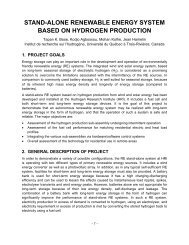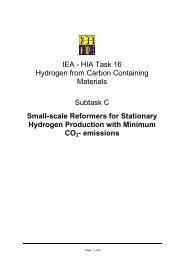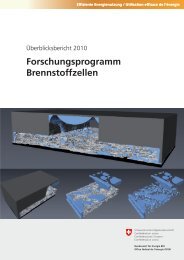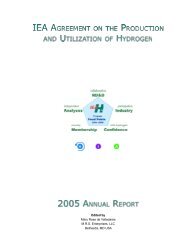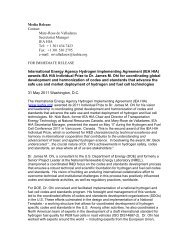Technology Status of Hydrogen Road Vehicles
Technology Status of Hydrogen Road Vehicles
Technology Status of Hydrogen Road Vehicles
Create successful ePaper yourself
Turn your PDF publications into a flip-book with our unique Google optimized e-Paper software.
! the best cases however, hydrogen vehicles approach competitiveness, since middle term gasoline prices<br />
<strong>of</strong> $0.40 per liter are not unimaginable, even in the U.S.; the hydride case <strong>of</strong> better-than-free gasoline<br />
suffers from the assumed 210 km range, and from much less power than with gasoline;<br />
! the great range in breakeven prices is attributable primarily to the uncertain cost-per-km <strong>of</strong> hydrogen fuel<br />
in the middle term, due to uncertain price for solar electricity...;<br />
! at lower interest rates, and higher baseline vehicle costs, hydrogen vehicles ...may be significantly more<br />
competitive than represented here;<br />
9. Vehicle comparisons<br />
....if a safe method <strong>of</strong> disposing <strong>of</strong> vents from LH 2 tanks is developed, hydride vehicles will lose most <strong>of</strong> their<br />
advantage.......since most <strong>of</strong> the breakeven gasoline prices for hydride and LH 2 vehicles are similar.<br />
.....10-15 years research on hydrides has failed to produce the ideal candidate, which reinforces the notion that<br />
more serious attention be given to LH 2 vehicles....<br />
....if a compressed gas H 2 (he goes for 690 bar) vehicle could provide the range <strong>of</strong> an LH 2 vehicle at the same<br />
cost, it could be the preferred hydrogen storage method.<br />
.....costs aside, hydride vehicles would be inferior to gasoline vehicles in range, bulky storage, and<br />
performance...while LH 2 vehicles have the boil<strong>of</strong>f problem, and bulkier storage than gasoline vehicles<br />
10. Areas for further research<br />
Concerning fuel storage, three areas are emphasized for progress: hydrides for higher vehicle range and<br />
performance; “clever” repackaging <strong>of</strong> components to <strong>of</strong>fset the inevitable loss <strong>of</strong> trunk space to bulky storage;<br />
reliable, low-cost boil<strong>of</strong>f control devices for LH 2 vehicles.<br />
The possibility <strong>of</strong> small-scale H 2 liquefiers for refueling stations should be investigated.....<br />
Concerning safety, perhaps the most important research issue is to determine under what conditions hydrogen<br />
can be shipped in the existing natural gas network.<br />
Concerning performance and environmental impacts, ....it would be worthwhile to investigate the use <strong>of</strong> late<br />
injection <strong>of</strong> high pressure gaseous H 2 on volumetric density, and also on NO x with lean operation (same for<br />
LH 2).<br />
Concerning cost, the objective is defined as the best-case described in the paper, because in any other scenario<br />
hydrogen vehicles are not socially cost-effective, and in the worst cases they are extraordinarily expensive.<br />
If however, a relatively high value is placed on avoiding greenhouse warming and reducing dependence on<br />
an insecure and diminishing resource, this would change.<br />
In conclusion, this paper does not support the notion common among policy makers that hydrogen vehicles<br />
are strictly an exotic, distant-future possibility.....With a strong R&D effort, normal technological progress,<br />
and the expected reduction in the price <strong>of</strong> solar electricity, hydrogen vehicles could be (socially) costcompetitive<br />
within 30 years or less.<br />
53



